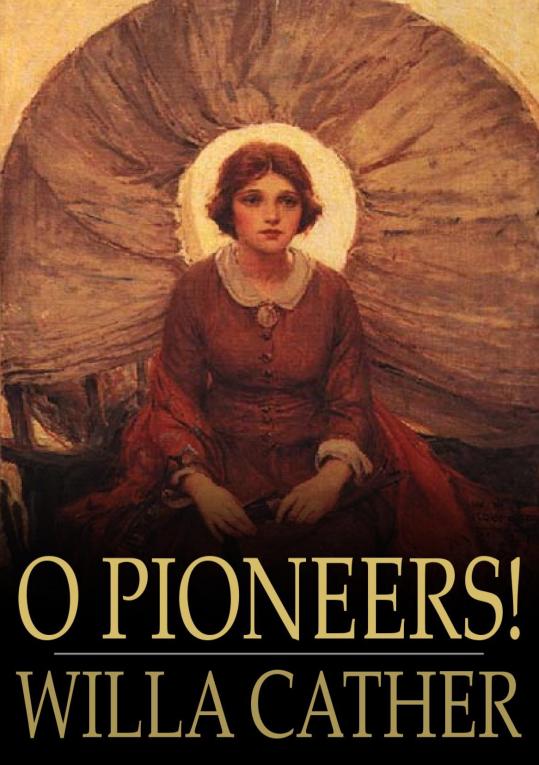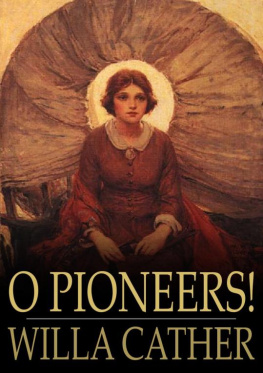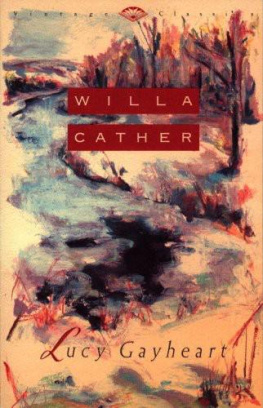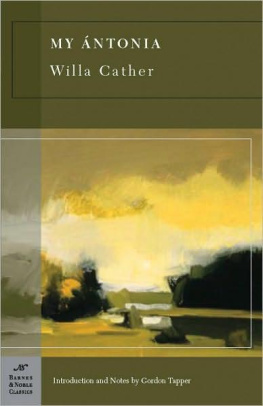Willa Cather - O Pioneers! (Floating Press)
Here you can read online Willa Cather - O Pioneers! (Floating Press) full text of the book (entire story) in english for free. Download pdf and epub, get meaning, cover and reviews about this ebook. year: 2009, publisher: The Floating Press, genre: Art. Description of the work, (preface) as well as reviews are available. Best literature library LitArk.com created for fans of good reading and offers a wide selection of genres:
Romance novel
Science fiction
Adventure
Detective
Science
History
Home and family
Prose
Art
Politics
Computer
Non-fiction
Religion
Business
Children
Humor
Choose a favorite category and find really read worthwhile books. Enjoy immersion in the world of imagination, feel the emotions of the characters or learn something new for yourself, make an fascinating discovery.
- Book:O Pioneers! (Floating Press)
- Author:
- Publisher:The Floating Press
- Genre:
- Year:2009
- Rating:3 / 5
- Favourites:Add to favourites
- Your mark:
- 60
- 1
- 2
- 3
- 4
- 5
O Pioneers! (Floating Press): summary, description and annotation
We offer to read an annotation, description, summary or preface (depends on what the author of the book "O Pioneers! (Floating Press)" wrote himself). If you haven't found the necessary information about the book — write in the comments, we will try to find it.
O Pioneers! (Floating Press) — read online for free the complete book (whole text) full work
Below is the text of the book, divided by pages. System saving the place of the last page read, allows you to conveniently read the book "O Pioneers! (Floating Press)" online for free, without having to search again every time where you left off. Put a bookmark, and you can go to the page where you finished reading at any time.
Font size:
Interval:
Bookmark:


O Pioneers!
First published in 1913.
ISBN 978-1-775415-72-5
2009 THE FLOATING PRESS.
While every effort has been used to ensure the accuracy and reliability of the information contained in The Floating Press edition of this book, The Floating Press does not assume liability or responsibility for any errors or omissions in this book. The Floating Press does not accept responsibility for loss suffered as a result of reliance upon the accuracy or currency of information contained in this book. Do not use while operating a motor vehicle or heavy equipment. Many suitcases look alike.
Visit www.thefloatingpress.com
One January day, thirty years ago, the little town of Hanover,anchored on a windy Nebraska tableland, was trying not to be blownaway. A mist of fine snowflakes was curling and eddying about thecluster of low drab buildings huddled on the gray prairie, undera gray sky. The dwelling-houses were set about haphazard on thetough prairie sod; some of them looked as if they had been moved inovernight, and others as if they were straying off by themselves,headed straight for the open plain. None of them had any appearanceof permanence, and the howling wind blew under them as well as overthem. The main street was a deeply rutted road, now frozen hard,which ran from the squat red railway station and the grain "elevator"at the north end of the town to the lumber yard and the horse pondat the south end. On either side of this road straggled two unevenrows of wooden buildings; the general merchandise stores, the twobanks, the drug store, the feed store, the saloon, the post-office.The board sidewalks were gray with trampled snow, but at two o'clockin the afternoon the shopkeepers, having come back from dinner,were keeping well behind their frosty windows. The children wereall in school, and there was nobody abroad in the streets but afew rough-looking countrymen in coarse overcoats, with their longcaps pulled down to their noses. Some of them had brought theirwives to town, and now and then a red or a plaid shawl flashed outof one store into the shelter of another. At the hitch-bars alongthe street a few heavy work-horses, harnessed to farm wagons,shivered under their blankets. About the station everything wasquiet, for there would not be another train in until night.
On the sidewalk in front of one of the stores sat a little Swedeboy, crying bitterly. He was about five years old. His black clothcoat was much too big for him and made him look like a little oldman. His shrunken brown flannel dress had been washed many timesand left a long stretch of stocking between the hem of his skirtand the tops of his clumsy, copper-toed shoes. His cap was pulleddown over his ears; his nose and his chubby cheeks were chapped andred with cold. He cried quietly, and the few people who hurriedby did not notice him. He was afraid to stop any one, afraid togo into the store and ask for help, so he sat wringing his longsleeves and looking up a telegraph pole beside him, whimpering, "Mykitten, oh, my kitten! Her will fweeze!" At the top of the polecrouched a shivering gray kitten, mewing faintly and clingingdesperately to the wood with her claws. The boy had been leftat the store while his sister went to the doctor's office, and inher absence a dog had chased his kitten up the pole. The littlecreature had never been so high before, and she was too frightenedto move. Her master was sunk in despair. He was a little countryboy, and this village was to him a very strange and perplexingplace, where people wore fine clothes and had hard hearts. Healways felt shy and awkward here, and wanted to hide behind thingsfor fear some one might laugh at him. Just now, he was too unhappyto care who laughed. At last he seemed to see a ray of hope: hissister was coming, and he got up and ran toward her in his heavyshoes.
His sister was a tall, strong girl, and she walked rapidly andresolutely, as if she knew exactly where she was going and what shewas going to do next. She wore a man's long ulster (not as if itwere an affliction, but as if it were very comfortable and belongedto her; carried it like a young soldier), and a round plush cap,tied down with a thick veil. She had a serious, thoughtful face,and her clear, deep blue eyes were fixed intently on the distance,without seeming to see anything, as if she were in trouble. Shedid not notice the little boy until he pulled her by the coat.Then she stopped short and stooped down to wipe his wet face.
"Why, Emil! I told you to stay in the store and not to come out.What is the matter with you?"
"My kitten, sister, my kitten! A man put her out, and a dog chasedher up there." His forefinger, projecting from the sleeve of hiscoat, pointed up to the wretched little creature on the pole.
"Oh, Emil! Didn't I tell you she'd get us into trouble of somekind, if you brought her? What made you tease me so? But there,I ought to have known better myself." She went to the foot of thepole and held out her arms, crying, "Kitty, kitty, kitty," but thekitten only mewed and faintly waved its tail. Alexandra turnedaway decidedly. "No, she won't come down. Somebody will have togo up after her. I saw the Linstrums' wagon in town. I'll go andsee if I can find Carl. Maybe he can do something. Only you muststop crying, or I won't go a step. Where's your comforter? Didyou leave it in the store? Never mind. Hold still, till I putthis on you."
She unwound the brown veil from her head and tied it about histhroat. A shabby little traveling man, who was just then coming outof the store on his way to the saloon, stopped and gazed stupidlyat the shining mass of hair she bared when she took off her veil;two thick braids, pinned about her head in the German way, with afringe of reddish-yellow curls blowing out from under her cap. Hetook his cigar out of his mouth and held the wet end between thefingers of his woolen glove. "My God, girl, what a head of hair!"he exclaimed, quite innocently and foolishly. She stabbed him witha glance of Amazonian fierceness and drew in her lower lipmostunnecessary severity. It gave the little clothing drummer such astart that he actually let his cigar fall to the sidewalk and wentoff weakly in the teeth of the wind to the saloon. His hand wasstill unsteady when he took his glass from the bartender. Hisfeeble flirtatious instincts had been crushed before, but neverso mercilessly. He felt cheap and ill-used, as if some one hadtaken advantage of him. When a drummer had been knocking about inlittle drab towns and crawling across the wintry country in dirtysmokingcars, was he to be blamed if, when he chanced upon a finehuman creature, he suddenly wished himself more of a man?
While the little drummer was drinking to recover his nerve, Alexandrahurried to the drug store as the most likely place to find CarlLinstrum. There he was, turning over a portfolio of chromo "studies"which the druggist sold to the Hanover women who did chinapainting.Alexandra explained her predicament, and the boy followed her tothe corner, where Emil still sat by the pole.
"I'll have to go up after her, Alexandra. I think at the depotthey have some spikes I can strap on my feet. Wait a minute." Carlthrust his hands into his pockets, lowered his head, and darted upthe street against the north wind. He was a tall boy of fifteen,slight and narrow-chested. When he came back with the spikes,Alexandra asked him what he had done with his overcoat.
Font size:
Interval:
Bookmark:
Similar books «O Pioneers! (Floating Press)»
Look at similar books to O Pioneers! (Floating Press). We have selected literature similar in name and meaning in the hope of providing readers with more options to find new, interesting, not yet read works.
Discussion, reviews of the book O Pioneers! (Floating Press) and just readers' own opinions. Leave your comments, write what you think about the work, its meaning or the main characters. Specify what exactly you liked and what you didn't like, and why you think so.








